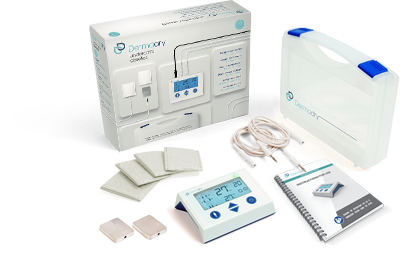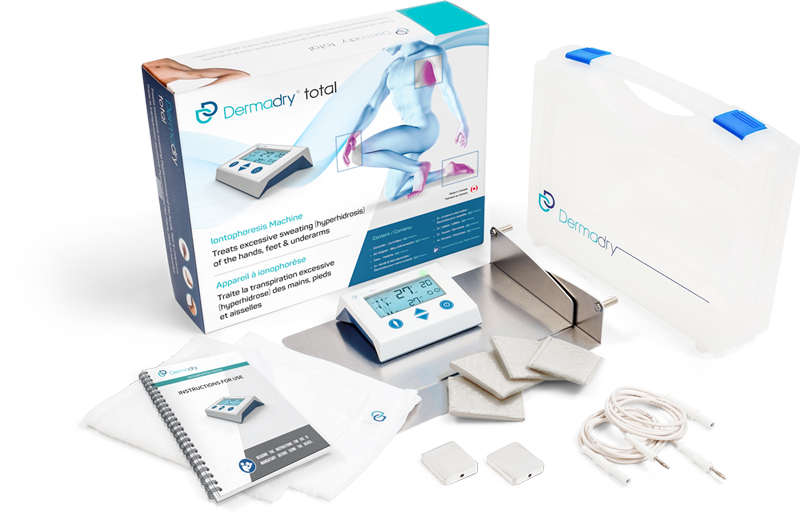Does Sweating Help You Detox? Debunking Common Sweat Misconceptions
Dermadry Team
We all sweat every day, even when we don’t realize it. Sweating is a natural process that happens when your body temperature rises. It's your body's way of cooling itself down. It’s not gross, and a very crucial part of being human!
However, there are a lot of myths and misconceptions regarding sweating as it’s a bit of a misunderstood concept. Below we debunk some of the most popular and enduring sweat myths and shed some light on how your sweat truly benefits you. Yeah, that’s right, sweating can actually be good for you! However, there are a lot of things that sweat will not do. Let’s break it down.
Myth: Sweating can help you lose weight.
Reality: Sweating does not help you lose weight. In fact, sweating excessively can cause dehydration which causes your body to hold onto water, which can lead to temporary weight gain. If you notice that you weigh less after sweating excessively, this is just due to losing water weight. Water weight will be regained as soon as you replenish your hydration levels.
Myth: The more you sweat, the more effective your workout is.
Reality: Sweating is not an indicator of how hard you are working out, it is only an indicator of your body temperature. So, you can still have an effective workout without sweating a lot. You don't need to sweat buckets to reap the benefits of exercise. In fact, sweating too much can actually be dangerous, as it can lead to dehydration. Regardless of your weight, body composition, or fitness level, your sweat levels are not an indicator of how effective your workout has been. Sweating levels are also influenced by external factors such as the place you are working out in.
Myth: Overweight people always sweat more when working out.
Reality: Sweat is not solely related to body weight, it is mainly related to body temperature. So, regardless of your weight, you will sweat when your body temperature rises. Some people with a low body fat percentage will sweat more than someone with a higher body fat percentage. Heart rate and calories burned are better indicators of the intensity of your workout. Some may even have a medical condition called primary hyperhidrosis that is uncontrollable excessive sweating. This can affect anyone regardless of weight or physical fitness.
Myth: Sweating helps your body detox.
Reality: There is a common misconception that sweat can help to detox the body, but this is not true. While sweat does contain trace amounts of toxins, these amounts are negligible. Sweat does not help to flush toxins out of the body, it helps to cool the body down. The body has its own natural detoxification process through the liver and kidneys, and sweat is not a part of that.
Myth: Sweat has a strong odor.
Reality: Sweat itself is odorless. However, when it mixes with bacteria on the skin, it can produce a strong odor. The longer sweat stays on the skin, the more time bacteria have to feed off of it, which is why maintaining proper hygiene and showering after intensive sweating sessions is crucial. As the body has two types of sweat glands, the apocrine ones located mainly in the armpits, groin and scalp, are the ones responsible for body odor. For some, body odor may be so strong and uncontrollable that it is classified as a medical condition called bromhidrosis.
Myth: Sweating causes acne.
Reality: Sweat does not cause acne or pimples as pimples are a buildup of oil and debris on the skin, not sweat. Sweating can make acne and pimples worse. Acne is caused by a build-up of oil and bacteria on the skin. When you sweat, the sweat can mix with the oil and bacteria, which can cause acne to flare up. It’s important to wash your face after sweating excessively, especially if you are prone to acne, as it can make it worse as bacteria like to feed off of sweat. Sweat can also make pimples on your back worse.
Myth: Sweat causes yellow stains on clothing.
Reality: Sweat is a colorless liquid. Yellow stains on clothing in the underarm region are caused by aluminum, which is the active ingredient in antiperspirant. Once sweat and aluminum mix, they can leave behind yellow stains. Sweat can also mix with other products on your body and lead to general discolouration. The only cases when sweat has a color is an extremely rare condition called chromhidrosis.
Myth: There is always a reason for sweating.
Reality: We may only notice when we sweat when we’re sweating heavily (e.g. hot days, exercising) but we’re always sweating. Excessive sweating can be caused by a number of things, including anxiety, menopause, and certain medications. However, in some cases, there is no known cause. Some people sweat a lot more than others, and this is generally not a cause for concern. Excessive sweating is a condition called primary hyperhidrosis and it can affect anyone and cause excessive sweating anytime, anyplace.
Sweating can tell us a lot about our health. It's important to remember that sweating is a normal and healthy process. However, if you're concerned about your sweating, or have noticed any considerable changes, talk to your doctor.
Consult our guide of sweat disorders and conditions to learn more about the different medical conditions associated with sweating. If you’re part of the 5% of the population that suffers from excessive sweating, then click here to learn more about how Dermadry iontophoresis can help you get your excessive sweating under control.























